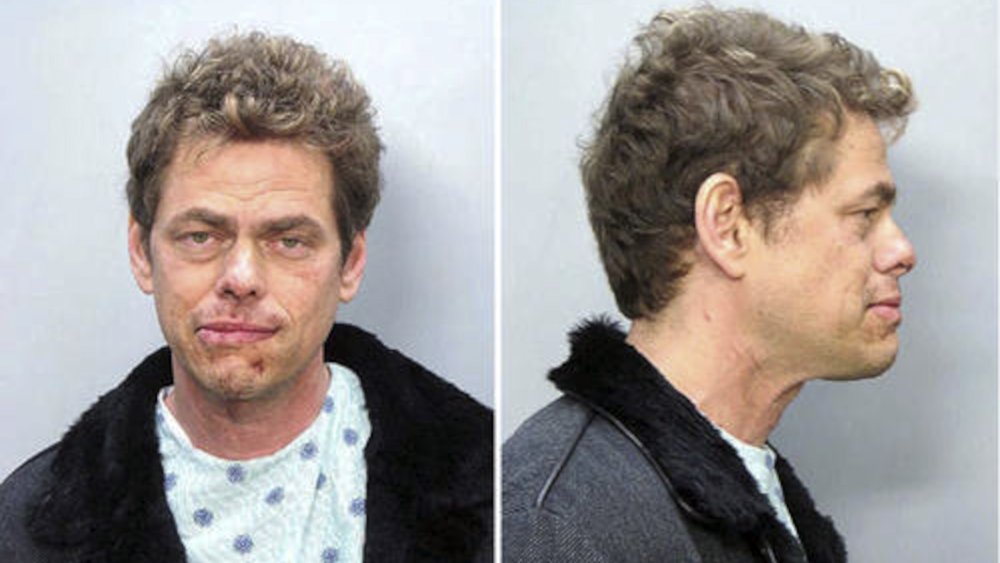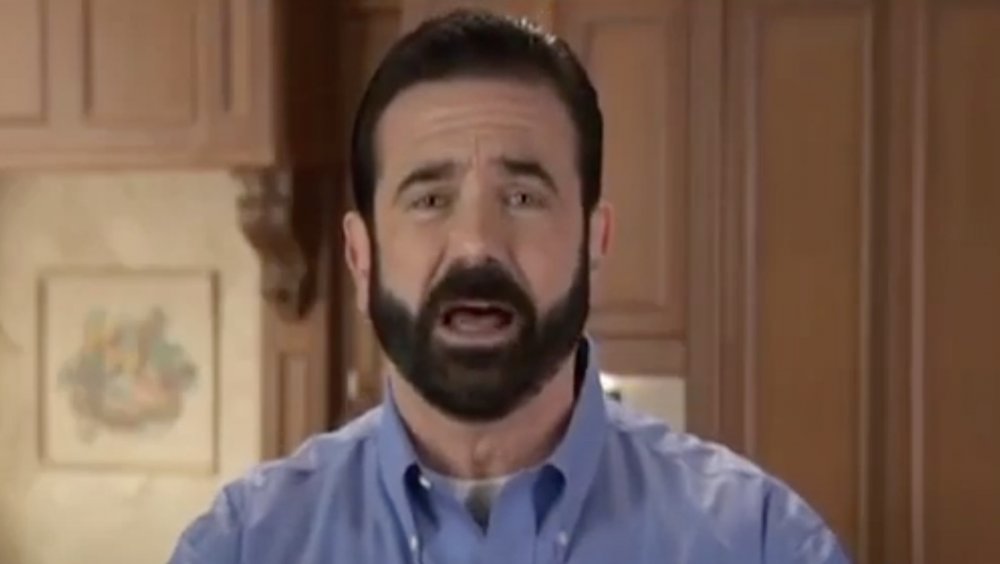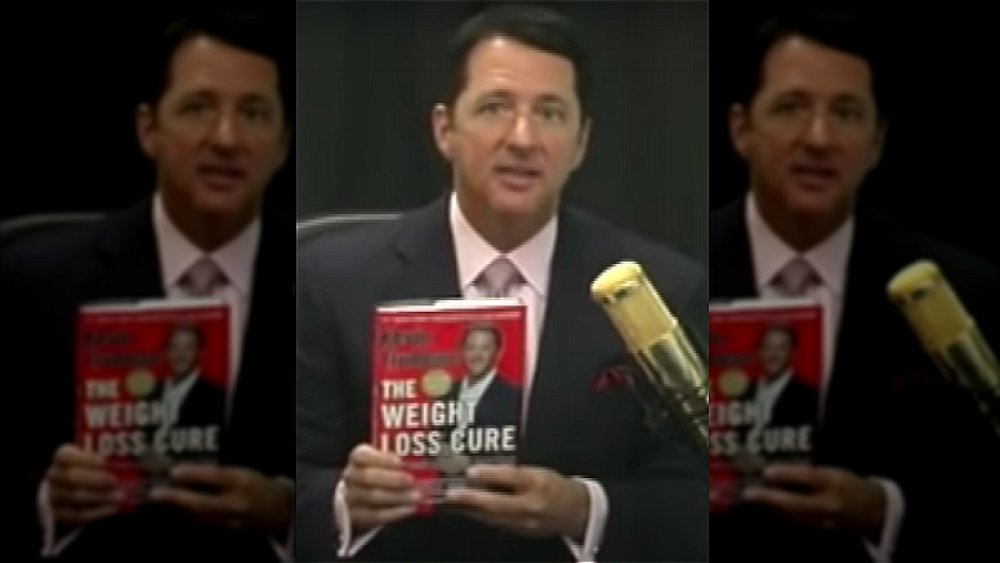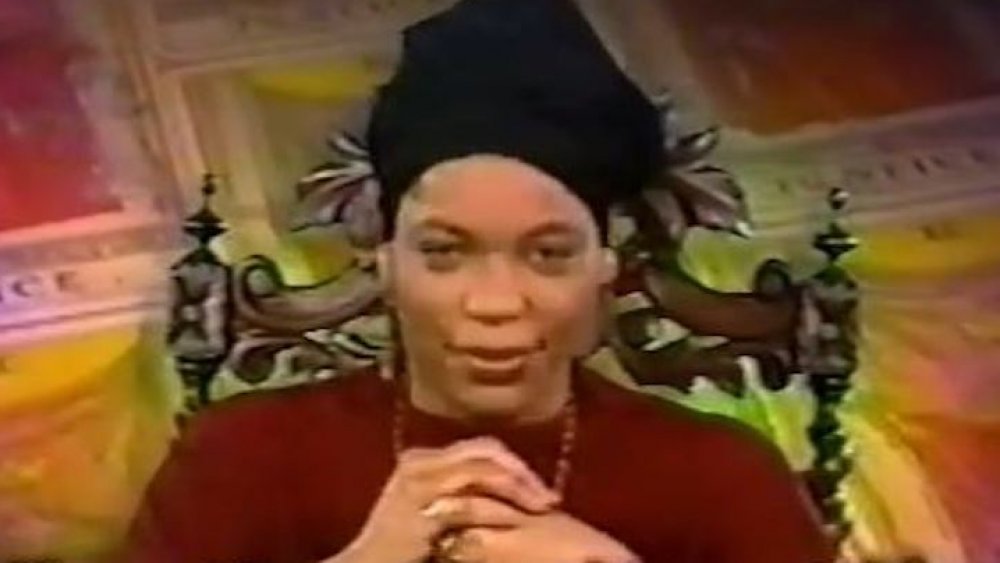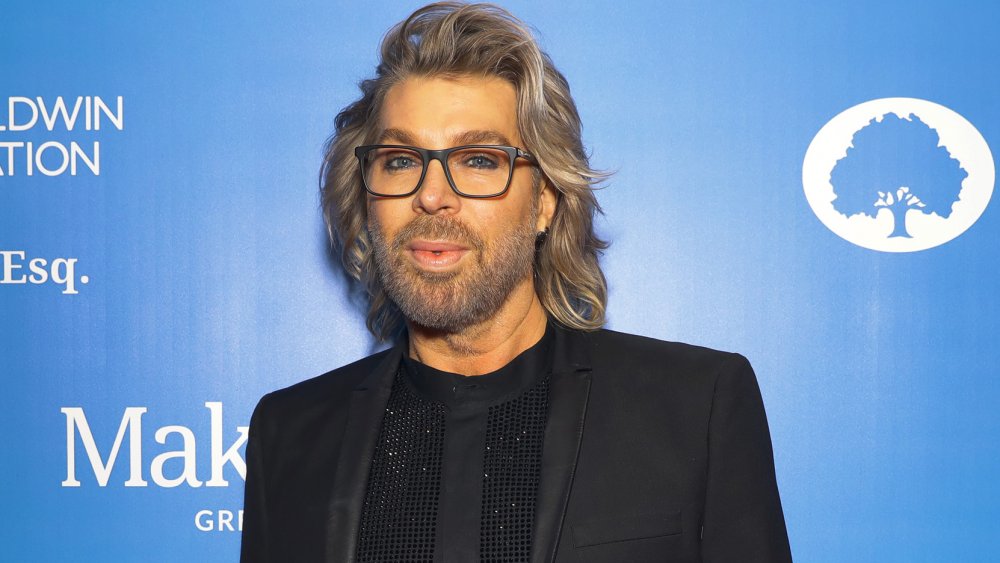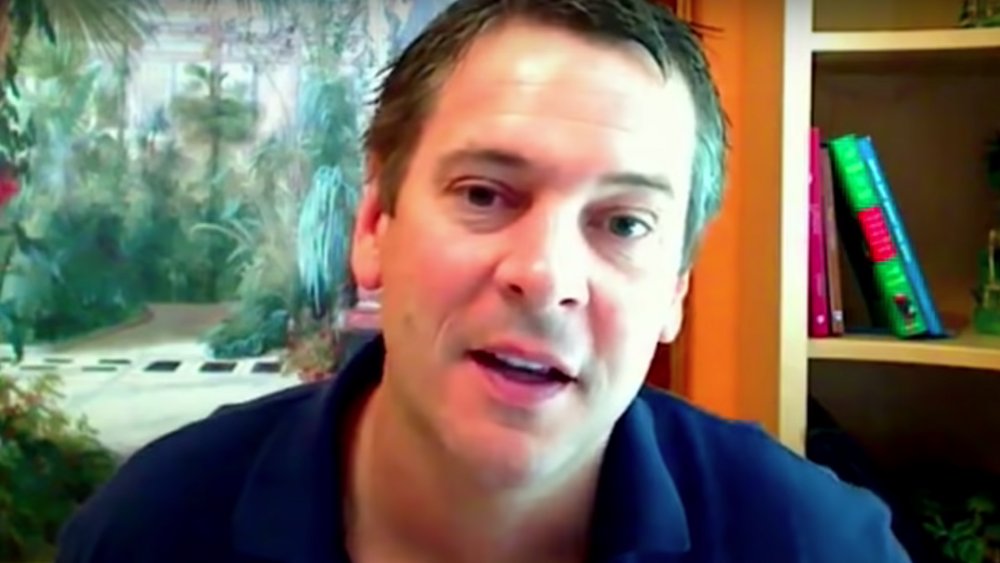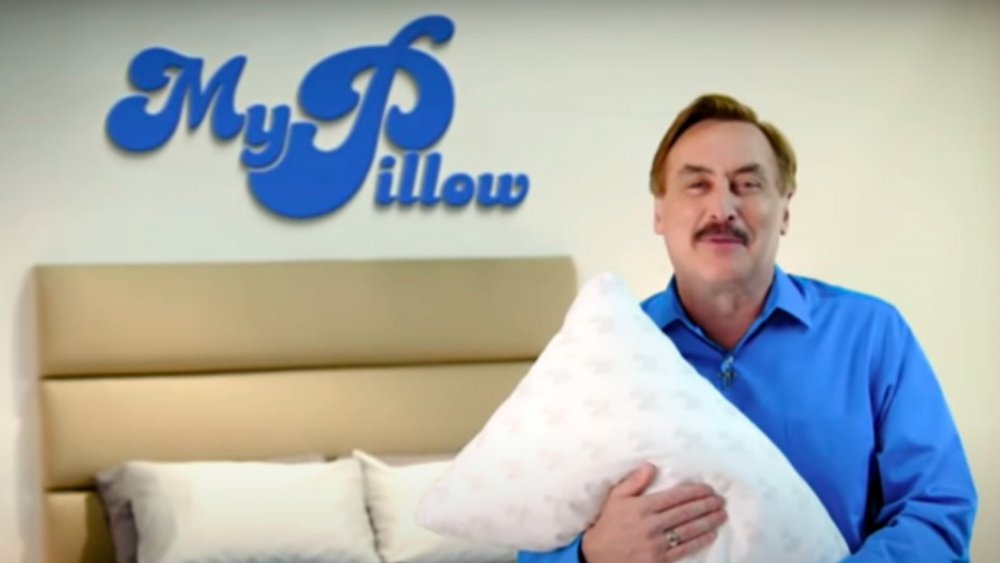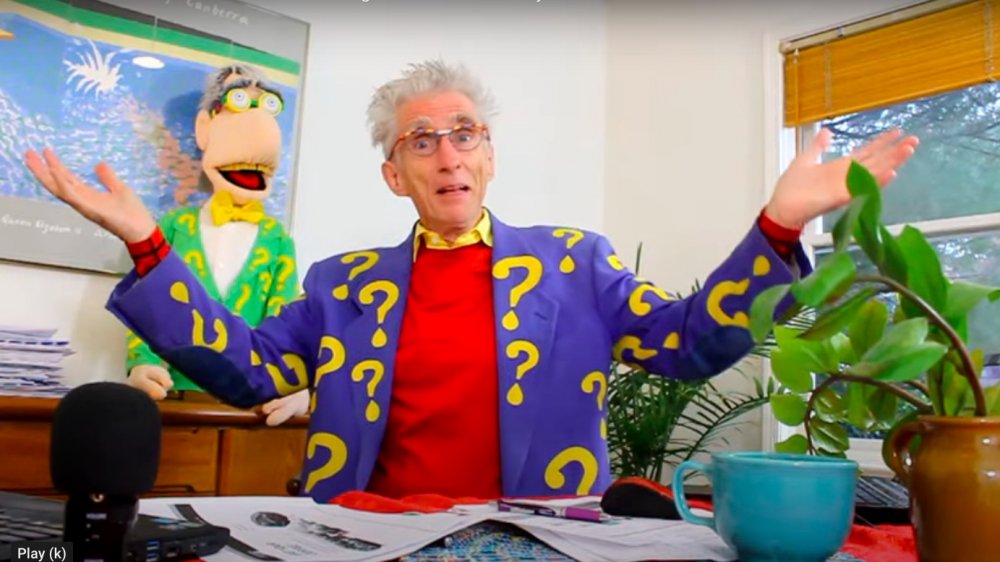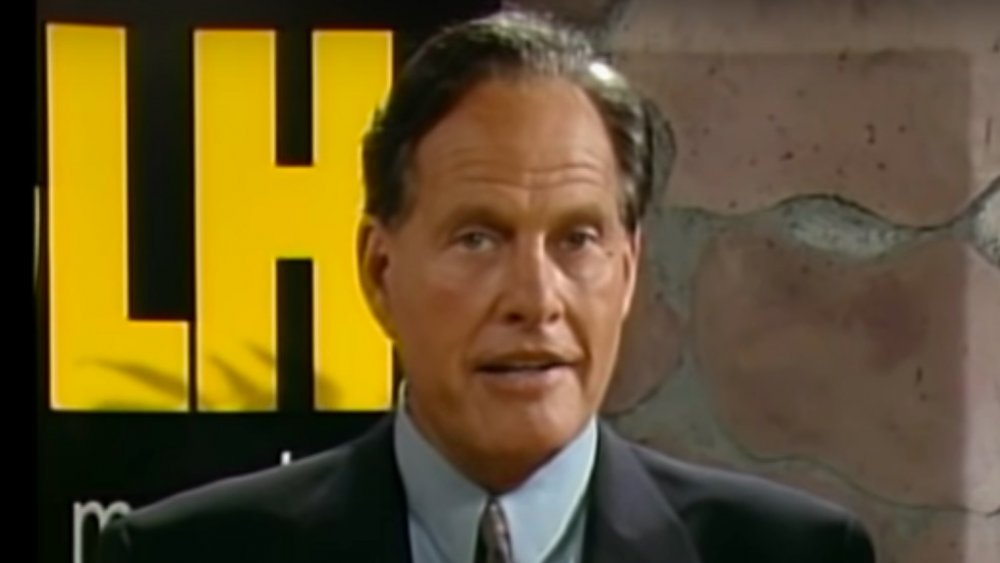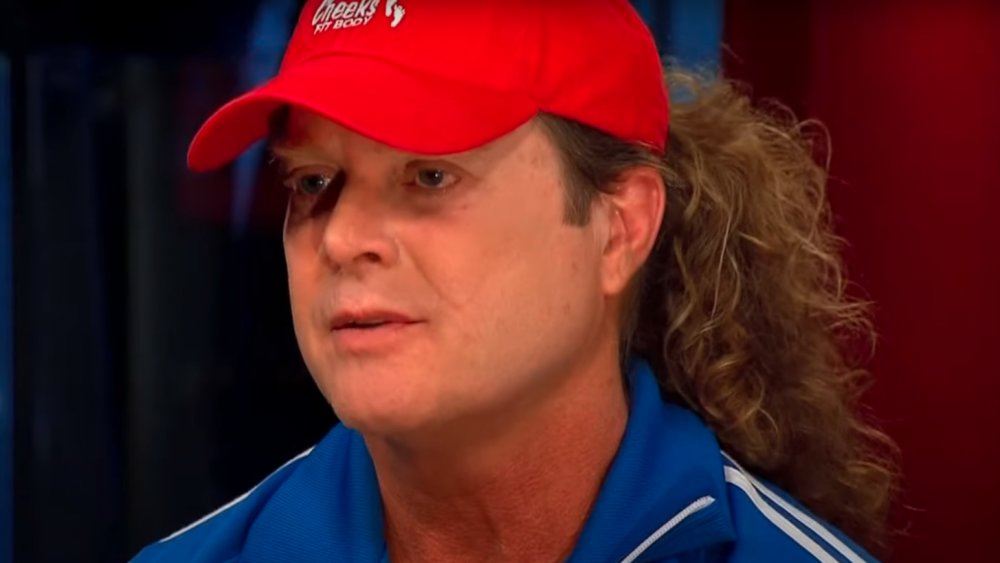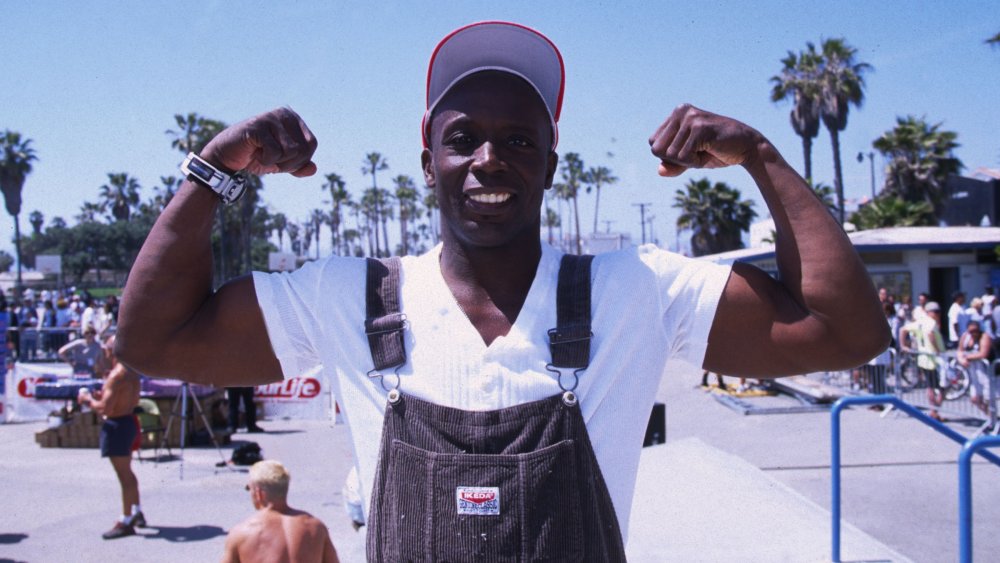The Most Controversial As Seen On TV Celebs
We may receive a commission on purchases made from links.
Since the earliest days of the medium, commercials have been an integral part of television as advertisers utilize all manner of psychological manipulation to sell viewers their wares. One unique sub-genre of television advertising can be witnessed in the "As Seen on TV" commercials, hawking such wondrous gems as the Shoedini (essentially a shoehorn on a stick) and the Potty Putter (which, yes, is a mini golf set you play with while you're on the toilet).
Sometimes the people who shill this stuff wind up becoming celebrities in their own right. Fitness guru Richard Simmons, for example, not only made zillions by selling diet plans and exercise videos on TV, he also became a ubiquitous talk show guest with a lengthy roster of screen credits.
But these infomercial stars detoured from fame to infamy by becoming embroiled in scandal. As a result, they traded late night TV for everything from lawsuits to federal fraud investigations to jail sentences and, in extreme cases, even death. Keep on reading to find out the shady truth behind the most controversial As Seen on TV celebs.
Remember when the ShamWow guy punched a prostitute?
Offer Shlomi, a.k.a. Vince Offer, a.k.a. The ShamWow Guy, began appearing on television screens in the late 2000s hawking the ShamWow, which claimed to be the one-stop solution for any household's absorption needs. "It's like a chamois, it's like a towel, it's like a sponge!" Offer trumpeted in the product's infomercials.
In 2009, The Smoking Gun reported that Offer was arrested after getting into a violent altercation with prostitute Sasha Harris in his Miami hotel room after she offered him "straight sex" for a $1,000 fee. After the payment was made, he claimed that when he went in for a kiss, Harris bit his tongue "and would not let go." In order to free his trapped tongue, Shlomi punched Harris repeatedly until she let go, resulting in "facial fractures and lacerations all over her face." Shlomi, now bleeding, ran to the hotel lobby and had security guards contact police. When the officers arrived, they arrested both Shlomi and Harris for felony aggravated battery; prosecutors subsequently "declined to file formal charges."
Several years after the incident, Offer told NBC News that his ShamWow success had led him down a hard-partying path. The arrest, he admitted, "probably saved my life."
What role did cocaine play in Billy Mays' death?
It was impossible to watch television in the mid-2000s without hearing ubiquitous pitchman Billy Mays yelling "Hi, Billy Mays here!" at top volume while hawking everything from OxiClean to Hercules Hooks to ShamWow knockoff Zorbeez.
It all came to an end for Mays when he was found dead in his Tampa, Fla. home in June 2009. He was just 50 years old. NPR reported a weird wrinkle in the story when it was revealed that Mays' death came one day after he was aboard an airplane that "blew out a tire" while landing, with Mays reportedly smashed on the head by an object that fell from an overhead bin during the rough touchdown. An even weirder wrinkle came to light after an autopsy was performed. As CNN reported, the medical examiner determined the cause of death to be "a lethal arrhythmia of the heart caused by hypertensive and arteriosclerotic heart disease," and "further concluded that cocaine use caused or contributed to the development of his heart disease, and therefore contributed to his death."
But wait! According to the Chicago Tribune, Mays' wife found the autopsy results to be "so upsetting" that a second autopsy was performed. This autopsy found that "acute cocaine intoxication" was not a factor in his death and that "the use of cocaine by Mr. Mays appears to have occurred a remote time several days before his death."
The cure for Kevin Trudeau's fraud was prison
Kevin Trudeau positioned himself as a self-help guru who sold books promising weight-loss secrets, natural cures and free money that "they' don't want you to know about." One book in particular, The Weight Loss Cure 'They' Don't Want You to Know About, captured the attention of the Federal Trade Commission, which first fined Trudeau $500,000 in 1998 for "making false and misleading claims" in his infomercials.
A decade later, Trudeau had seemingly not changed his ways. During that period, the FTC charged him several more times for continuing to make bogus claims, such as his exaggerated claims about potential cancer prevention related to a coral calcium supplement. In 2008, a judge ordered Trudeau to pay a whopping $37,616,161, determining that was "the amount consumers paid in response to the deceptive infomercials."
By 2014, authorities had apparently had enough. Associated Press (via USA Today) reported that Trudeau received a 10-year prison sentence, with prosecutors describing him as an "uncontrollable huckster" whose deceptive commercials had aired "at least 32,000 times" after he was legally banned from running any. Prior to sentencing, U.S. District Judge Ronald Guzman said that Trudeau had "steadfastly attempted to cheat others for his own personal gain" over the course of decades, describing him as "deceitful to the core."
Jamaican psychic Miss Cleo was neither Jamaican nor psychic
For more than a decade, beginning in the late 1990s, television viewers were dazzled by the psychic predictions of Miss Cleo. With her thick Jamaican patois and exotic Caribbean wardrobe, Miss Cleo invited callers to phone her Psychic Readers Network to receive the answers to their most pressing life questions.
In 2002, the FTC charged Miss Cleo's operation with "deceptive advertising, billing and collection practices," alleging that the callers were billed $4.99 per minute, and were routinely left on hold for several minutes — with the billing commencing immediately at the start of each call. According to Slate, the company was also hit with numerous lawsuits.
As it turned out, Miss Cleo wasn't actually Jamaican, and had no psychic abilities. As The Washington Post reported after her 2016 death, she was actually Los Angeles-born actress Youree Dell Harris, who had been hired to play the role of Miss Cleo; she was never charged in any of the lawsuits as she was strictly an employee. And while the company that hired her raked in an estimated $1 billion, Harris herself didn't see any of that wealth. According to a 2009 interview, at that time Harris was living in Florida and still doing psychic readings as Miss Cleo, charging $75-$250 per reading. She didn't refer to herself as a psychic, however, but a "voodoo priestess."
Chaz Dean's cleansing conditioner touched a lot of people
Hollywood hair guru Chaz Dean took his talent for styling hair to late-night television infomercials, selling his WEN Cleansing Conditioner. Described as "a revolutionary way to cleanse and hydrate the hair," the product has been endorsed by celebs such as Alyssa Milano and Holly Robinson Peete.
However, trouble emerged when customers noticed some horrific side effects. As Consumer Safety Guide reported, these included "hair loss, bald patches, hair breakage, and discoloration." In addition, customers also complained of "itching, skin rash, and eye irritation." By November 2016, the FDA reported that it "received 1,386 adverse event reports directly from consumers" about the companies products, with another "21,000 complaints reported directly to [parent companies] Chaz Dean, Inc. and Guthy Renker, LLC" on top of that. A class action lawsuit was concurrently waged against the company, which insisted, in a statement to Today, that its Chaz Dean products were "safe, and millions of bottles have been sold over the last 16 years."
In October 2016, CBS Los Angeles reported that plaintiff base for the class action suit had ballooned to a jaw-dropping six million, with a federal judge approving a $26.25 million settlement — meaning an award of about $20,000 (the settlement was approved the following year). In a statement from Wen, the company continued to insist its products were safe, claiming they only agreed to the settlement because "the process of litigation is time consuming and costly."
Infomercial king Don Lapre's sad end after fraud charges
Self-proclaimed "King of Infomercials" Don Lapre made a fortune through his late-night TV infomercials, claiming he could rake in $50,000 a week by "placing tiny classified ads in the newspaper." He subsequently branched out into hawking a health supplement that he declared to be the Greatest Vitamin in the World. However, it wasn't just the vitamins he was selling. As People reported, the whole thing was actually a multilevel marketing scam promising people could earn up to $1,000 a week by simply setting up a website like this one to advertise the product. Once they'd done that, Lapre promised, they'd simply sit back and wait for the checks to come rolling in.
In 2011, The Arizona Republic reported that Lapre was indicted by a grand jury, and "charged with 41 counts of conspiracy, mail fraud, wire fraud and promotional money laundering." Over the course of his alleged schemes, he reportedly bilked some 220,000 people out of almost $52 million. If found guilty, Lapre faced fines of $250,000 to $500,000, and up to 25 years in a federal penitentiary.
Lapre was never sentenced. Days before he was set to stand trial, reported CBS News, he was found dead of an apparent suicide in his jail cell.
If you or someone you know is having suicidal thoughts, please call the National Suicide Prevention Lifeline at 1-800-273-TALK (8255) or text HOME to the Crisis Text Line at 741741.
The My Pillow guy can't fix your headache
When he got the idea for My Pillow, Mike Lindell was a crack addict with a string of failed businesses in his wake, noted CNBC in a profile of the wildly successful entrepreneur. By 2017, the now-sober Lindell's ubiquitous infomercials had sold 30 million pillows, with annual revenue of $300 million.
However, Lindell's claims that his pillow could cure such health woes as migraine headaches and fibromyalgia landed him in hot water. According to an NBC News report, in 2016 he was sued by the state of California over allegations of "deceptive advertising" that made "untrue or misleading" statements. Lindell denied making "any misleading claims," but agreed to pay civil penalties of $995,000 in addition to a $100,000 donation as "a business decision to prevent long and costly litigation ... and move on."
That wasn't the first scandal that Lindell had stepped in. According to the Minneapolis StarTribune, a video was posted on YouTube in 2014 that featured Lindell dropping F-bombs at a furious pace while berating employees about a botched order. Lindell admitted that was him in the video, but claimed it happened three to five years earlier and insisted he no longer acted that way in the office.
'Free money' guy Matthew Lesko blasted for deceptive claims
In such books as Getting Yours: The Complete Guide to Government Money, Matthew Lesko wrote extensively about the vast array of government-sponsored programs offering grants for various endeavors. Lesko subsequently took his shtick to late-night infomercials, wearing a suit adorned with question marks — not unlike Batman foe the Riddler — to sell his books purporting to instruct people on how they can access "free money."
However, a 2004 report from NBC News highlighted some problematic aspects of Lesko's claims that billions of government dollars are ripe for the taking. In fact, the New York State Consumer Protection Board issued a press release warning TV viewers that Lesko's claims were exaggerated. His primary goal, the group claimed, was convincing consumers to plunk down $37.95 for a copy of his latest book.
While the agency conceded the information in Lesko's books was not entirely incorrect, the claims in his infomercials contained "wild exaggerations" that they deemed deceptive. As Consumer Protection Board executive director Teresa A. Santiago explained, Lesko's claims that the federal government has billions in "hidden money" that people can use to "get out of debt" is "simply not true... These are entitlement programs... and the average person cannot apply for them."
Ron Popeil's Ronco filed for bankruptcy
Thanks to such Ronco gadgets as the Pocket Fisherman, Mr. Microphone, and even a doohickey that scrambled an egg while still inside the shell, TV pitchman Ron Popeil made a fortune selling all manner of stuff in low-rent TV commercials during the 1970s and '80s. In the ensuing decades, Popeil himself would become an infomercial sensation by hawking such products as pasta-makers, a combination rotisserie/barbecue and everyone's personal favorite, Great Looking Hair (GLH), which hid male pattern baldness and looked suspiciously like a can of spray paint.
Since the company's founding, Ronco has raked in more than $2 billion. Popeil sold the business "for nearly $60 million" in 2005, but by 2017 the company was sinking. According to a report in the New York Post, Ronco had posted millions in net losses for several years, and was "nearly $17 million in debt." Ronco attempted to raise $30 million with an IPO, offering "5 million shares of stock for $6 a share."
The IPO, however, was a bust. In 2018, the New York Post reported that Ronco filed for Chapter 11 bankruptcy. "I know the current owner and I'm a good friend of his," Popeil told the Post. "But running a business is not his talent."
Fitness guru Tony Little took a big financial hit
Ponytailed fitness guru Tony Little became a celebrity in the 1990s thanks to his infomercials promoting his Gazelle exercise machine and his Target Training System. As Little told CNBC in 2016, those infomercials had generated more than $3 billion in sales.
Little should have paid a little more attention, however, to who he hired to look after his finances. In 2011, Tampa Bay Newspapers reported that his former company controller, Mark Schreiber, was arrested and charged with embezzling $583,379 from his companies. "According to Mr. Little, they were beginning the process of dismissing him. Before they could do that, he resigned abruptly," Pinellas Park Police Department spokesman Brian Unmisig told the newspaper.
The following year, the Tampa Bay Times reported that Schreiber entered a guilty plea, admitting he wrote himself "more than 150 checks" totaling $658,456.28. He was sentenced to three years in the slammer and 10 years probation upon his release. In addition, a lien was placed on him for the amount he stole, while he was also ordered to undergo treatment for gambling addiction. "I would wish to see him spend time for his crime," Little said in a deposition.
Richard Simmons' vanishing act and stunning lawsuit loss
Flamboyant fitness guru Richard Simmons gained fame and fortune with his "as seen on TV" commercials for his Deal a Meal diet plan and Sweatin' to the Oldies exercise videos. A ubiquitous presence on TV talk shows, Simmons stunned the world when he pulled a vanishing act, largely disappearing from the public eye since 2014. Simmons' abrupt departure from the spotlight — and even the paparazzi — caused rampant speculation, his disappearance even becoming the subject of a popular podcast.
In 2016, Page Six reported that the National Enquirer, in a since-deleted report, offered an explanation for Simmons' exit: he was transitioning into a woman, and would soon emerge as Fiona. Simmons' attorneys responded with a defamation lawsuit, reported Variety, suing the Enquirer and RadarOnline (which also ran the story). "Let us be absolutely clear," Simmons' lawyers stated. "Mr. Simmons is not a woman; he has not undergone or contemplated sex-change surgery, or any surgery whatsoever to change from a man to a woman; he has not slowly transformed, or transformed in any way, into a female."
According to NBC News, the lawsuit proved to be unsuccessful with the judge in the case ruling that being mistakenly described as transgender doesn't fit the definition of defamation, as it does not engender "hatred, contempt, ridicule or obloquy." Simmons was ordered to pay the defendants' legal fees of $130,000.
Tao-Bo pitchman Billy Blanks sued his own lawyers
In the late 1990s, fitness trainer Billy Blanks developed his own blend of aerobics-style dancing and martial arts, which he dubbed Tae Bo and promoted via TV infomercials. The venture was wildly successful, bringing in hundreds of millions of dollars and providing Blanks himself with a reported personal net worth of $30 million.
Blanks' former manager, Seth Estroff, felt he was owed a piece of that pie. As the Los Angeles Times reported, in 1999 Estroff sued over what he claimed were unpaid royalties from Tae Bo videos. While the suit was settled the following year, another seemingly unrelated lawsuit led Blanks to sue his legal team, alleging malpractice when lawyers missed a filing deadline that cost him the case. According to the Chicago Tribune, Blanks emerged victorious, and in 2005 was awarded a whopping $35 million in damages. "This verdict represents justice," Blanks said in a statement. "In many respects, our trust in the system has been restored."
That trust was shaken in 2009, when Courthouse News reported that an appeals court reversed $25 million of that judgement. Blanks' subsequent attempt to appeal the appeal was unsuccessful, with Metropolitan News-Enterprise reporting that the California Supreme Court voted 6-0 to deny Blanks' request that his appeal be reviewed.


